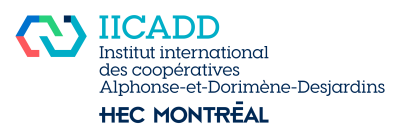A new line of research for the Institute!
Cooperative action research
What is cooperative action research? It’s a research approach characterized by a double movement of enterprise and thought, combining research and action, leading to the production of knowledge of a dual nature: practical and scientific. Participatory, it involves the association of cooperators and researchers in carrying out the research. In cooperatives, action research is a practice that can contribute to their social and economic development.
For Jean-François Draperi (2007, p. 68), heir to Henri Desroche, thinker of action research, this tradition is fundamental to the social economy, because “dissociated, the enterprise movement and the thought movement no longer make sense: deprived of its theoretical critique, of its confrontation with values, the enterprise becomes trivialized; deprived of experimentation, of confrontation with reality, thought sclerotizes or is reduced to an artifact”.
With this in mind, this line of research aims to gain a better understanding of the practices (implementation methods) and contributions of this approach in a cooperative context. What are the practices of action research in cooperatives? What challenges do cooperatives face when using action research approaches? And how do they do so? What relationships are forged between cooperators and researchers? How do these approaches contribute to social and economic development? Which cooperatives are using this approach to develop? What are the practices around the world?
The aim of this research area is to create a forum for sharing action research practices in the cooperative context:
- linking cooperators and researchers,
- supporting project deployment,
- offering methodological approaches, tools and seminar-workshops for training in cooperative action research.
This results in several types of action:
- PEDAGOGY: Introduce and train the student community in this approach (in the context of integration projects, internships or dissertations).
- BIBLIOGRAPHY: Create a collection of bibliographical references devoted to cooperative action-research practices on PortailCoop.
- TRANSFER: Promote the dissemination of these ongoing action-research practices among cooperatives.
- METHODOLOGY: Shape and disseminate action research fact sheets and tools; initiate reflection on how to use data produced by cooperatives in a scientific perspective.
- RESEARCH: Support research projects adopting this approach; analyze the process of building PortailCoop as a database for cooperatives and for research.
Researcher in charge: Justine Ballon
Methodologies
CoopGateway is a digital library serving the cooperative and mutualist movement and a central source of evidence for teaching, research and transfer activities on cooperatives and mutuals. Created by the Alphonse and Dorimène Desjardins International Institute for Cooperatives of HEC Montréal, CoopGateway aims to promote access, development and sharing of knowledge on cooperatives and mutuals in the digital age.
This research component aims to develop research methodologies and evidence on cooperatives and mutuals based on the interests of researchers in order to support research and contribute to rigorous scientific analyzes in the field.
Scientific production relating to cooperatives and mutuals remains, in number of articles, relatively absent from the most prestigious scientific journals. This offers a unique opportunity for researchers to distinguish themselves in a field that has been little explored in research. Researchers are invited to experiment with various qualitative and quantitative research methodologies that use CoopGateway data: textual analysis, historical research, artificial intelligence, processing of complex databases, etc. Here are examples of how CoopGateway has been used by researchers.
Lead researcher: Rafael Ziegler
CoopGateway and Research Data
The creation of thematic collections or research data makes it possible to gather, organize and make easily accessible documents and data on specific subjects related to cooperatives and mutuals. Thematic collections may contain documents from annual meetings, activity reports, balance sheets, financial statements, journals, books, press releases, etc. Research data can be datasets, spreadsheets, etc. Researchers are invited to contribute to the development of thematic collections or research data for CoopGateway.
